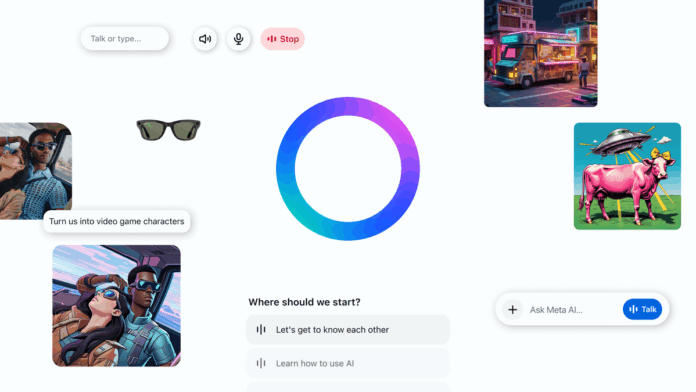Meta AI has its own standalone app. The new app, powered by Meta’s Llama 4 AI, is both a standalone product as well as a replacement for Meta View. This was previously used to connect with the Ray-Ban Meta Smart Glasses.
Meta is making a big move here, positioning voice interaction as the most natural and intuitive way to interact with AI. The app allows for hands-free chatting, and even a demonstration of full-duplex voice, which lets you speak and listen simultaneously.
This is very useful, considering how eager Meta is to integrate Meta AI into the company’s wider product portfolio, particularly the Ray-Ban Meta Smart Glasses. These AI-enabled glasses will now be operated through the Meta AI application, replacing the Meta View App they currently rely upon.
This means that you can start a discussion on one platform, and then easily transition to another. You can easily replicate your settings by opening the Devices tab in the app.
You can ask a question using your smart glasses and get a response from Meta AI. Later, you can pick up the same thread on your smartphone or desktop. You can switch between voice chat on your glasses and reading the conversation from your app’s History tab. You could, for example, be out walking and ask Meta AI to help you find a bookstore nearby. The answer is saved in your Meta AI application for later review. The Discover feed is another major feature of the Meta AI app. You can view publicly shared items like successful prompts and images that they’ve created on the feed. Then, remix them to suit your needs.
The desktop version of Meta AI will also be revamped, with a new user interface and more options for image generation. There’s a document editor that allows you to edit text, add visuals and export it as PDF.
The AI is able to adapt its behavior depending on what you do in the other Meta apps. Meta AI uses your Instagram and Facebook activities to personalize its responses.
If you ask it where to eat dinner, it may suggest a ramen restaurant that your friend mentioned last week. Ask it for advice on a upcoming vacation and it will remember that you once said that you “travel light, but overpack emotionally”and suggest an itinerary to fit your attitude.
Meta wants Meta AI at the center of all your digital activities. The company’s pitch makes it seem like you will always be checking in on the app, whether it is on your phone or your head.
The style of the ChatGPT app is similar to that of the ChatGPT. Meta wants to differentiate itself from OpenAI by focusing on the personal aspect of an AI assistant, rather than the more general utility.
Meta has more personal data than anyone else. Meta AI tapping into social data, voice patterns, and even smart glasses to deliver answers tailored for you feels very on brand.
The concept of Meta AI creating a mental scrapbook based on your Instagram and Facebook posts might not appeal to all people. If you’re worried, you can put on the smart glass and ask Meta AI to help.
Meta wants to flood your social media feeds, but I don’t think that’s a good idea.
Eric Hal Schwartz has been a freelance writer at TechRadar for more than 15 years. He has covered the intersection of technology and the world. He was the head writer of Voicebot.ai for five years and was at the forefront of reporting on large language models and generative AI. Since then, he has become an expert in the products of generative AI, including OpenAI’s ChatGPT and Anthropic’s Claude. He also knows Google Gemini and all other synthetic media tools. His experience spans print, digital and broadcast media as well as live events. He’s now continuing to tell stories that people want to hear and need to know about the rapidly changing AI space and the impact it has on their lives. Eric is based out of New York City.


